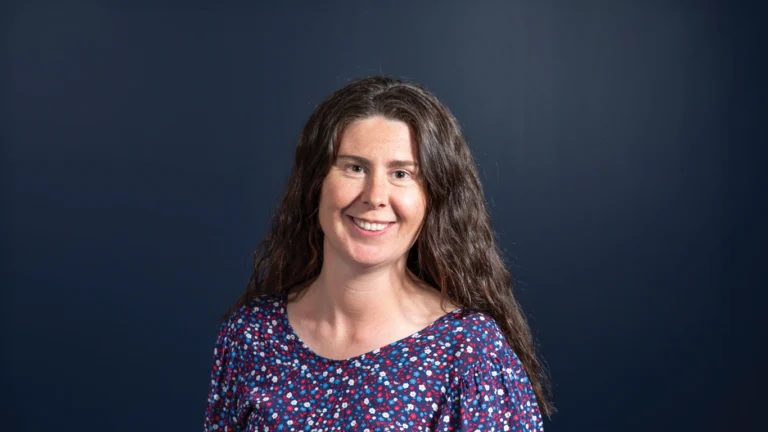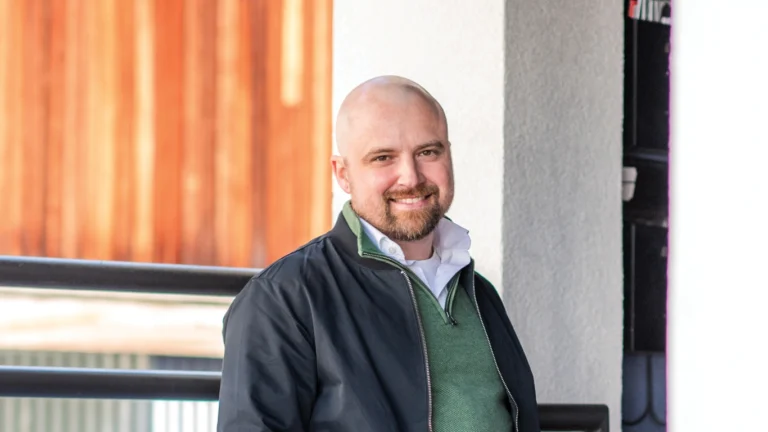
Whether you’re establishing yourself as corporate counsel or building a practice of your own, it can take a step away from the status quo to make your mark in the modern legal world – something that Dr Maria Pozza, former in-house lawyer and expert in New Zealand and international space law, has discovered first hand.
From satellite launches to cybersecurity, the work that crosses Maria’s desk places her at the forefront of one of the world’s most innovative industries. However, her trajectory to get here has been anything but smooth.
Brimming with enthusiasm but straight to the point, Maria is a lawyer whose understanding of her practice area is palpable – as is her passion for what she does. Driven, above all, to influence change, she has long been fascinated by the intersection of law, politics, and international relations: the complex web that connects global nations and citizens.
Even so, the idea that she would one day advise on the laws of outer space was beyond Maria’s contemplation when she began her legal career. Initially called to the bar at Lincoln’s Inn in London, she cross-qualified in New Zealand soon after, quickly discovering that her lack of domestic experience was a barrier to finding the kind of groundbreaking opportunities she was looking for.
With no clear path forward, Maria was forced to rethink her options. “The number of closed doors I was confronted with almost had me quitting law right there and then,” she admits.
However, she wasn’t quite ready to throw in the towel. Curious about policy as an alternative route, she came across the Masters of International Studies at Otago University, a course that offered the chance to pursue an original line of research spanning legal and non-legal disciplines.
Space law was a topic that had already begun to fascinate her, particularly in relation to arms control, and a fact-finding mission during her studies led to a surprising discovery. “While there was a lot of international research out there on space law, there was little – if any – from New Zealand,” she says.
Bingo – she had stumbled upon the niche she had been looking for.
Did New Zealand’s apparent lack of interest in space make sense? Perhaps, for a small island nation. But, then again, with resources dwindling and global powers jostling for position in the space race, it seemed unlikely that any government would opt out of this potentially infinite new playing field by choice.
But more to the point, Maria explains, her interest was piqued by the strategic potential that New Zealand holds in the global landscape of space exploration. Because of its position far south of the equator, the country is perfectly situated for launching low-earth orbit satellites, a more cost-efficient option than the crowded geo-stationary orbit which sits directly above the equator.
Throw in the country’s low population density status, which makes launch activity less disruptive, and Maria saw an obvious strategic opportunity, along with its legal risks. “I realized it was only a matter of time before we became active in space, but we had no legal framework in place,” she says.
“While there was a lot of international research on space law, there was little – if any – from New Zealand.”
It was clear that this was a critical policy issue for New Zealand – one which came with a regulatory gap. “Domestic laws are so important in this area,” Maria explains, “because they create a legal framework between governments and private entities who aren’t otherwise bound by international treaties.” She could see that this framework was urgently needed – and sooner rather than later.
Completing her masters with a distinction, Maria identified the next step towards her goal: a PhD in space law and policy. However, securing funding was a challenge. Unable to make headway with legal scholarships, she expanded her search, looking instead at politics and the sciences for support.
As it turned out, a number of scholarship committees that oversaw funding in the sciences, social sciences, and politics were convinced by her work, and she secured several prestigious scholarships, including a historical research grant from the Ministry of Foreign Affairs. This was an important lesson, she reflects. “When you’re a square peg in a round hole, it pays to look for alternative opportunities.”
While working on her PhD, Maria was doing her best to make in-roads with critical stakeholders in New Zealand. “I took every opportunity to make my case,” she says. “I met with MPs and government agencies, spoke at universities, and presented at international as well as domestic conferences.”
But the truth was that Maria was still trying to convince her domestic audience to pay attention to what was happening in space, an effort which was largely met with skepticism. Such palpable disbelief was sometimes hard to deal with. “When you’re not being taken seriously, it can really grind you down. You start to wonder if you’re on the wrong path,” she admits.
However, outside New Zealand, a different story was playing out. With commercial interests in space accelerating across the globe, other spacefaring nations already had mature space programs in place, along with domestic legal and policy frameworks to support them. In international circles, Maria’s work wasn’t just being taken seriously – it was already well underway.
While the difference between her reception at home and abroad was initially a source of frustration, Maria soon realized that her jurisdiction wasn’t a disadvantage. In fact, her growing reputation as a New Zealand space lawyer gave her both a competitive edge and a blank canvas. As she was welcomed into professional circles like the International Institute of Space Law, she realized that her point of difference gave her, as she says, “an incredible opportunity to make my own mark”.
Finally leaning into her position as an outlier, Maria persevered in her mission to push for New Zealand to engage with space law. But her domestic audience needed help to realize the relevance of outer space to national priorities – quite simply, they couldn’t see how the issue had anything to do with them.
Instead of talking about the problem in the abstract, Maria realized, she needed to connect the need for space legislation with the things her audience did care about – and demonstrate how, if left unregulated, the issue would eventually impact New Zealand’s economy, environment, and people.
One way to do this, she realized, was via the subject of satellites, something most of us use every day without making the connection to the mobile phones that are always in our hands.
So she started asking questions. “How many times have you used your phone today to check the weather? Used Google Maps? Done online banking? Without satellites, none of this would be possible. It would be chaos.”
This is a tactic, she notes, which has also proven invaluable throughout her time as an in-house lawyer. “To gain the trust of business stakeholders, I above all needed to understand what mattered to them. The same approach applied when it came to wider advocacy.”
“When you’re not being taken seriously, it can really grind you down. You start to wonder if you’re on the wrong path.”
As she started giving stakeholders in New Zealand tangible reasons to take space law seriously, the change in response was noticeable. “I had begun to speak the language of my audience,” she reflects – and that’s when things started to accelerate. At the same time, commercial space interests in New Zealand began to grow, and finally, in 2017, the country drafted and adopted its first landmark space legislation.
Maria’s challenge now was to translate this new legislative framework into practice. Once again, in such a narrow niche, this was a tricky assignment. After working out of a few law firms, it soon became clear that she needed to set up on her own, and her law firm Gravity Lawyers became operational in 2019. As the space industry continues to boom in New Zealand, Maria has her work cut out, and the scope of her practice continues to expand.
The shift in the policy atmosphere has also been remarkable – at the end of last year, New Zealand announced plans to launch its own satellite mission by 2030, with the Space Minister, Judith Collins, acknowledging that “satellites deliver a wide range of essential services that underpin daily life in New Zealand” and noting the critical role that space has begun to play in national security. For Maria, this is a critical step for the development of New Zealand’s space industry.
In the early days of Gravity Lawyers, though, Maria faced a host of new challenges beyond the work itself; top of the list was building her reputation in an environment which was then still playing catch-up. Marketing herself proved a learning curve. “Law school doesn’t teach you anything about marketing or branding,” she reflects. “There was so much to learn. For example, I didn’t know that I needed to be strict about when and how my brand was used in order for it to become recognizable.”
Again, she likens this to the effort she had to put into building her personal brand as an in-house lawyer. “In- house, it’s so critical that everyone knows who you are and what you do,” she says. “I used to go out of my way to make sure I was visible. I needed stakeholders to understand how to work with me – because the last thing you want is for the business to make decisions without talking to legal first.”
And while marketing was key for getting clients through the door at Gravity Lawyers, her other challenge was keeping them. “I had to learn what to post on social media, when to post it, and how often… I had to make sure I was always offering something of value without creating customer fatigue.” Again, she reflects that it was a similar story in- house. “You can’t constantly be in your stakeholders’ faces, but equally, you don’t want to be in an organization for years without anyone knowing who you are.”
Getting this right continues to be a balancing act – but one which Maria knows is integral to the success of her business.
As Maria’s career continues to evolve, she’s excited about what lies beyond the horizon. From the sustainability issues connected with space debris to potential future conflicts over lunar resources, she knows that lawyers in this area have some huge issues to tackle in the coming years.
And she’s not alone. As the whole legal landscape continues to morph under the influence of technology, many other legal professionals face pressure to step into new and unfamiliar spaces.
Whether you’re working within an emerging sector, such as tech or cybersecurity, or simply trying to make your mark within your business, Maria’s experience offers some invaluable lessons: listen to your stakeholders, don’t be afraid to pivot and look further afield for opportunities if things aren’t working, and above all, be your own best supporter – it’s tough being a harbinger of change, but the rewards are often worth it.
As Maria reflects, “When you’re trying to introduce people to something new, you have to constantly remind yourself why what you’re doing is important. You have to remind yourself why you’re not backing down.”
Modern in-house counsel are expected to act as proactive problem solvers – so it pays to think beyond precedent. Being open to alternative solutions (even those which are not immediately obvious) can yield more impactful results in the long run.
Delivering in-house advice can be tricky. If it’s perceived to hinder rather than help a business goal, it may not be well received. To make things more palatable, learn the language of your business users. What do they care about most? What pressures do they face? The more you understand, the easier it’ll be to get them on side.
Although it might feel strange to think of yourself as a ‘brand’, creating a clear persona for yourself within your business is a smart move. By ensuring everyone knows who you are and what you do, you’ll cement your role as a strategic business partner – not just a lawyer!


